
Though you get three extra days to pay your taxes this year, it probably won't make you feel much better.
As the April 18 deadline approaches, many Americans are counting on a tax refund, big time. Around 75% say the refund is important to their overall financial situation, according to a recent Bankrate survey of U.S. adults; (43% said very important and 32% said somewhat important.)
Some 28% said they would use the refund to pay down debt, while another 26% said it would go into savings.
But whatever they do with it, there's a good chance some of it is just going to pay other taxes.
Federal and state income taxes aren’t the only taxes we pay, of course. Have you ever added up all of your taxes? There’s payroll tax, which goes to Social Security and Medicare, property tax (which, of course, is passed on to renters) capital gains tax on investments, and estate tax when someone dies. Then there are the ones that are harder to add up: sales taxes and excise taxes.
Excise taxes are imposed on the sale of things like fuel, airline tickets, heavy trucks and highway tractors, indoor tanning, tires, tobacco, alcohol and other goods and services, according to the IRS. Others are imposed on wireless phone services, soda, insurance and gambling, according to the Tax Foundation, an independent tax policy nonprofit.
Excise taxes are often included in the final price of products and services, and are often hidden to consumers, the Tax Foundation says. Studies show excise taxes are disproportionately borne by low-income taxpayers, making them one of the most regressive components of the U.S. tax system, according to the Tax Foundation.
Some states have little or no state income tax, but they tax residents in other ways. The state of Washington is one of the states that does not have personal income tax, but it has one of the steepest overall sales and excise tax burdens, according to research by personal finance site WalletHub. In a comparison of overall tax burdens in all 50 states, WalletHub shows that Washington has the second highest sales/excise tax burden at 5.66%.
Unlike tax rates, which vary based on income or other factors, tax burden measures the proportion of total personal income that residents pay toward state and local taxes.
To rank all 50 states by tax burden, WalletHub collected data from the Urban-Brookings Tax Policy Center, a nonpartisan think-tank based in Washington D.C. They added up these three tax burdens to get the overall tax burden for each state:
- Property tax as a share of personal income
- Individual income tax as a share of personal income
- Total sales & excise tax as a share of personal income
New York tops the list for highest overall tax burden, and the highest income tax, too.
Hawaii has the highest sales and excise taxes and New Hampshire has the lowest. Some of the states that are known for having no income tax ended up in the middle in terms of overall tax burdens due to other high taxes, like Washington, which ranks 25th overall. Texas, with no state income tax, ranks 29th with a 4% property tax burden and a 4.01% sales and excise tax burden.
Here’s WalletHub’s ranking of all 50 states by overall tax burden, with the individual breakdowns and rankings by category.
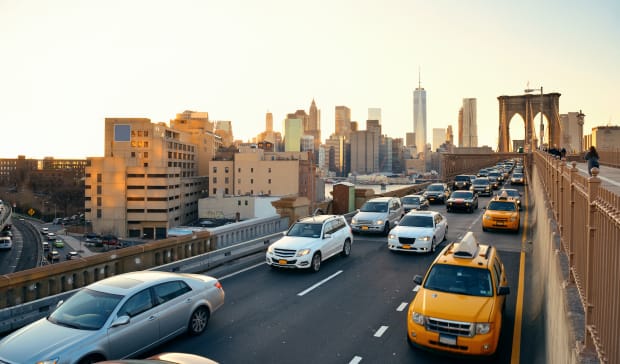
1. New York
- Total tax burden: 12.47%
- Property tax burden: 4.36% (5th highest)
- Individual income tax burden: 4.72% (1st)
- Total sales & excise tax burden: 3.39% (24th highest)
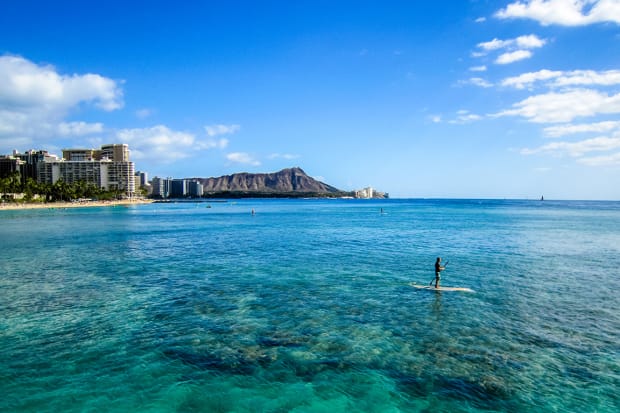
2. Hawaii
- Total tax burden: 12.31%
- Property tax burden: 2.74% (26th)
- Individual income tax burden: 2.86% (10th)
- Total sales & excise tax burden: 6.71% (1st)
Shutterstock

3. Maine
- Total tax burden: 11.14%
- Property tax burden: 5.33% (1st)
- Individual income tax burden: 2.52% (14th)
- Total sales & excise tax burden: 3.29% (26th)
Shutterstock

4. Vermont
- Total tax burden: 10.28%
- Property tax burden: 4.98% (2nd)
- Individual income tax burden: 2.07% (27th)
- Total sales & excise tax burden: 3.23% (27th)
Shutterstock

5. Connecticut
- Total tax burden: 9.83%
- Property tax burden: 4.24% (6th)
- Individual income tax burden: 2.92% (9th)
- Total sales & excise tax burden: 2.67% (40th)
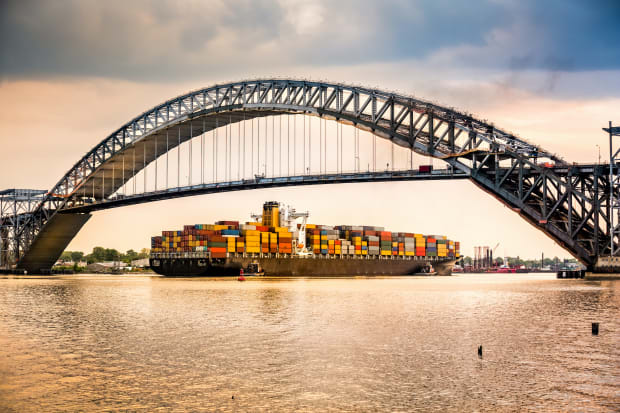
6. New Jersey
- Total tax burden: 9.76%
- Property tax burden: 4.88% (4th)
- Individual income tax burden: 2.36% (17th)
- Total sales & excise tax burden: 2.52% (43rd)

7. Maryland
- Total tax burden: 9.44%
- Property tax burden: 2.66% (31st)
- Individual income tax burden: 4.21% (2nd)
- Total sales & excise tax burden: 2.57% (41st)

8. Minnesota
- Total tax burden: 9.41%
- Property tax burden: 2.89% (22nd)
- Individual income tax burden: 3.11% (6th)
- Total sales & excise tax burden: 3.41% (23rd)
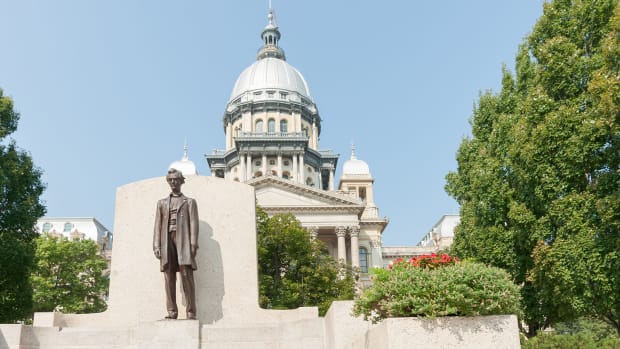
9. Illinois
- Total tax burden: 9.38%
- Property tax burden: 3.66% (10th)
- Individual income tax burden: 2.27% (22nd)
- Total sales & excise tax burden: 3.45% (22nd)
Shutterstock

10. Iowa
- Total tax burden: 9.15%
- Property tax burden: 3.40% (14th)
- Individual income tax burden: 2.41% (16th)
- Total sales & excise tax burden: 3.34% (25th)
Shutterstock

11. Rhode Island
- Total tax burden: 9.07%
- Property tax burden: 4.17% (7th)
- Individual income tax burden: 1.93% (33rd)
- Total sales & excise tax burden: 2.97% (33rd)

12. California
- Total tax burden: 8.89%
- Property tax burden: 2.79% (23rd)
- Individual income tax burden: 3.05% (7th)
- Total sales & excise tax burden: 3.05% (31st)
alexroch / Shutterstock
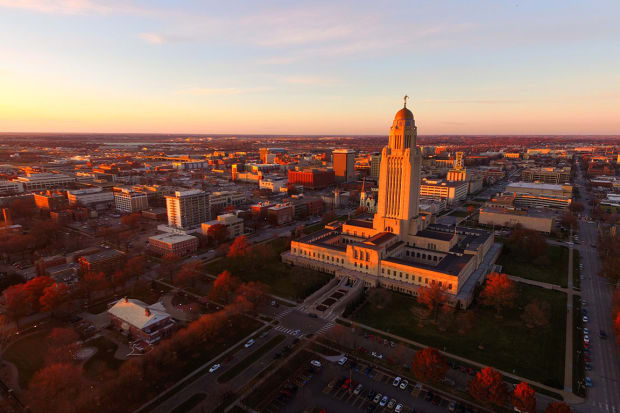
13. Nebraska
- Total tax burden: 8.84%
- Property tax burden: 3.67% (9th)
- Individual income tax burden: 2.19% (24th)
- Total sales & excise tax burden: 2.98% (32nd)
Shutterstock

14. New Mexico
- Total tax burden: 8.83%
- Property tax burden: 1.95% (43rd)
- Individual income tax burden: 1.26% (39th)
- Total sales & excise tax burden: 5.62% (3rd)
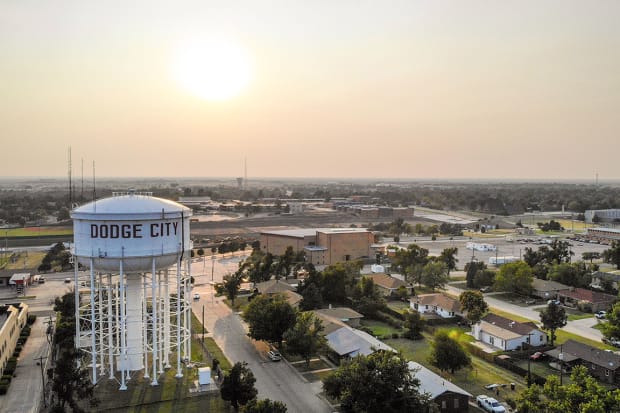
15. Kansas
- Total tax burden: 8.71%
- Property tax burden: 3.08% (17th)
- Individual income tax burden: 2.07% (27th)
- Total sales & excise tax burden: 3.56% (19th)
Eduardo Medrano / Shutterstock
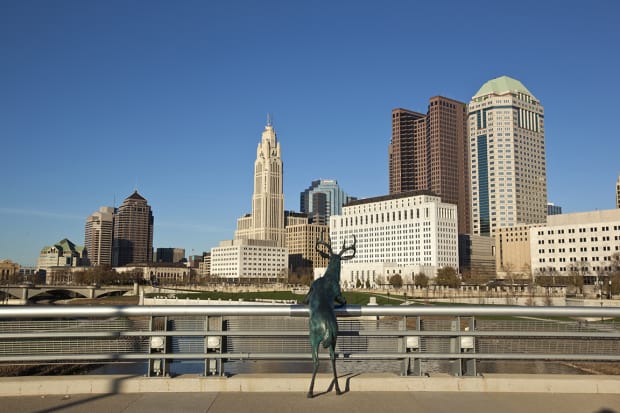
16. Ohio
- Total tax burden: 8.65%
- Property tax burden: 2.74% (26th)
- Individual income tax burden: 2.28% (21st)
- Total sales & excise tax burden: 3.63% (16th)
aceshot1 / Shutterstock

17. Wisconsin
- Total tax burden: 8.62%
- Property tax burden: 3.12% (16th)
- Individual income tax burden: 2.63% (13th)
- Total sales & excise tax burden: 2.87% (37th)

18. Indiana
- Total tax burden: 8.58%
- Property tax burden: 2.22% (39th)
- Individual income tax burden: 2.73% (12th)
- Total sales & excise tax burden: 3.63% (16th)

19. Mississippi
- Total tax burden: 8.56%
- Property tax burden: 2.76% (24th)
- Individual income tax burden: 1.49% (38th)
- Total sales & excise tax burden: 4.31% (8th)

20. Massachusetts
- Total tax burden: 8.48%
- Property tax burden: 3.42% (13th)
- Individual income tax burden: 3.22% (4th)
- Total sales & excise tax burden: 1.84% (45th)
James Kirkikis / Shutterstock

21. Kentucky
- Total tax burden: 8.43%
- Property tax burden: 1.93% (44th)
- Individual income tax burden: 3.04% (8th)
- Total sales & excise tax burden: 3.46% (21st)
Shutterstock

22. Arkansas
- Total tax burden: 8.40%
- Property tax burden: 1.68% (48th)
- Individual income tax burden: 2.04% (29th)
- Total sales & excise tax burden: 4.68% (5th)
RozenskiP / Shutterstock

23. West Virginia
- Total tax burden: 8.36%
- Property tax burden: 2.23% (38th)
- Individual income tax burden: 2.43% (15th)
- Total sales & excise tax burden: 3.70% (14th)

24. Colorado
- Total tax burden: 8.28%
- Property tax burden: 3.05% (19th)
- Individual income tax burden: 2.04% (29th)
- Total sales & excise tax burden: 3.19% (28th)

25. Washington
- Total tax burden: 8.24%
- Property tax burden: 2.58% (32nd)
- Individual income tax burden: 0.00% (44th)
- Total sales & excise tax burden: 5.66% (2nd)

26. Virginia
- Total tax burden: 8.23%
- Property tax burden: 2.97% (21st)
- Individual income tax burden: 2.82% (11th)
- Total sales & excise tax burden: 2.44% (44th)

27. Utah
- Total tax burden: 8.08%
- Property tax burden: 2.34% (37th)
- Individual income tax burden: 2.20% (23rd)
- Total sales & excise tax burden: 3.54% (20th)
Shutterstock

28. Louisiana
- Total tax burden: 8.05%
- Property tax burden: 1.80% (46th)
- Individual income tax burden: 1.66% (37th)
- Total sales & excise tax burden: 4.59% (6th)

29. Texas
- Total tax burden: 8.01%
- Property tax burden: 4.00% (8th)
- Individual income tax burden: 0.00% (44th)
- Total sales & excise tax burden: 4.01% (11th)

30. Pennsylvania
- Total tax burden: 7.95%
- Property tax burden: 2.71% (28th)
- Individual income tax burden: 2.32% (19th)
- Total sales & excise tax burden: 2.92% (36th)

31. Oregon
- Total tax burden: 7.80%
- Property tax burden: 3.07% (18th)
- Individual income tax burden: 3.62% (3rd)
- Total sales & excise tax burden: 1.11% (48th)
Shutterstock

32. Nevada
- Total tax burden: 7.69%
- Property tax burden: 2.13% (41st)
- Individual income tax burden: 0.00% (44th)
- Total sales & excise tax burden: 5.56% (4th)
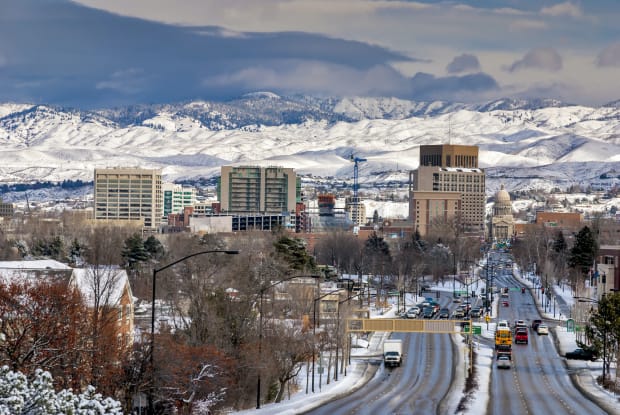
33. Idaho
- Total tax burden: 7.64%
- Property tax burden: 2.35% (35th)
- Individual income tax burden: 2.15% (25th)
- Total sales & excise tax burden: 3.14% (29th)
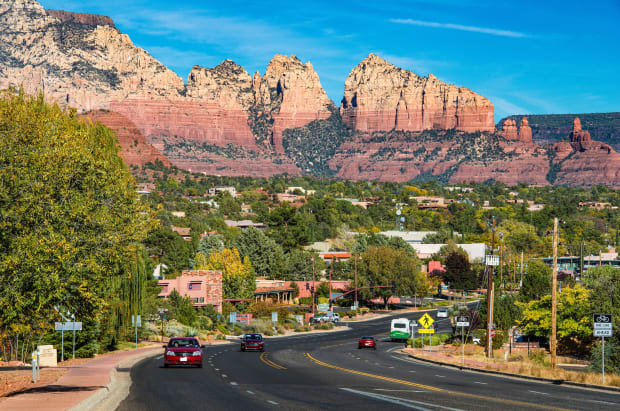
34. Arizona
- Total tax burden: 7.62%
- Property tax burden: 2.35% (35th)
- Individual income tax burden: 1.23% (40th)
- Total sales & excise tax burden: 4.04% (9th)

35. North Carolina
- Total tax burden: 7.60%
- Property tax burden: 2.12% (42nd)
- Individual income tax burden: 2.35% (18th)
- Total sales & excise tax burden: 3.13% (30th)
Shutterstock
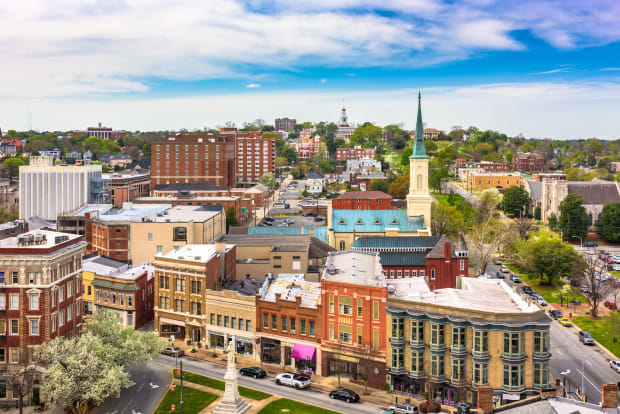
36. Georgia
- Total tax burden: 7.46%
- Property tax burden: 2.58% (32nd)
- Individual income tax burden: 2.11% (26th)
- Total sales & excise tax burden: 2.77% (38th)

37. South Carolina
- Total tax burden: 7.44%
- Property tax burden: 2.69% (29th)
- Individual income tax burden: 2.03% (31st)
- Total sales & excise tax burden: 2.72% (39th)
Shutterstock
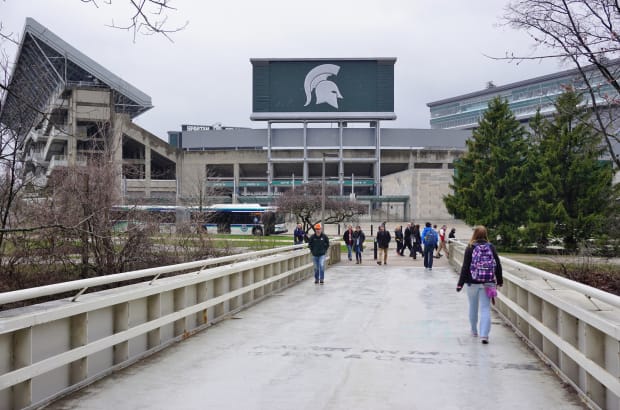
38. Michigan
- Total tax burden: 7.40%
- Property tax burden: 3.02% (20th)
- Individual income tax burden: 1.81% (35th)
- Total sales & excise tax burden: 2.57% (41st)

39. Alabama
- Total tax burden: 7.35%
- Property tax burden: 1.39% (50th)
- Individual income tax burden: 1.93% (33rd)
- Total sales & excise tax burden: 4.03% (10th)

40. North Dakota
- Total tax burden: 7.34%
- Property tax burden: 2.54% (34th)
- Individual income tax burden: 0.80% (41st)
- Total sales & excise tax burden: 4.00% (12th)
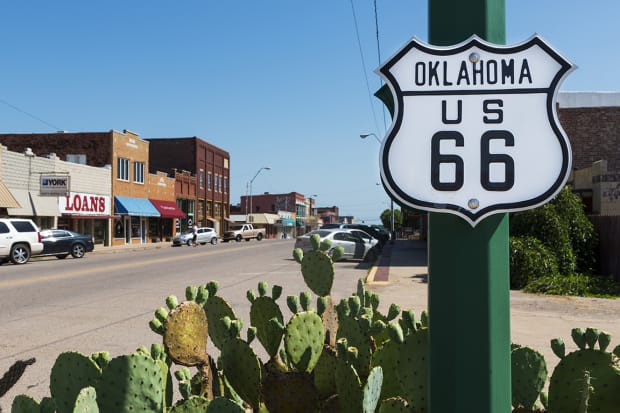
41. Oklahoma
- Total tax burden: 7.12%
- Property tax burden: 1.76% (47th)
- Individual income tax burden: 1.69% (36th)
- Total sales & excise tax burden: 3.67% (15th)
Shutterstock

42. Missouri
- Total tax burden: 7.11%
- Property tax burden: 2.16% (40th)
- Individual income tax burden: 1.99% (32nd)
- Total sales & excise tax burden: 2.96% (34th)
Shutterstock

43. Montana
- Total tax burden: 6.93%
- Property tax burden: 3.40% (14th)
- Individual income tax burden: 2.32% (19th)
- Total sales & excise tax burden: 1.21% (47th)

44. South Dakota
- Total tax burden: 6.69%
- Property tax burden: 2.69% (29th)
- Individual income tax burden: 0.00% (44th)
- Total sales & excise tax burden: 4.00% (12th)

45. Wyoming
- Total tax burden: 6.42%
- Property tax burden: 3.47% (12th)
- Individual income tax burden: 0.00% (44th)
- Total sales & excise tax burden: 2.95% (35th)
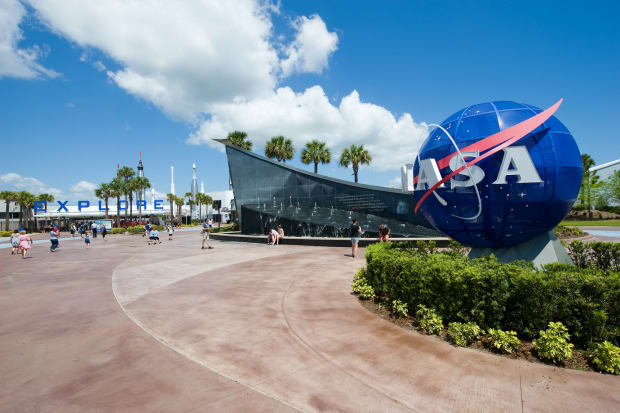
46. Florida
- Total tax burden: 6.33%
- Property tax burden: 2.75% (25th)
- Individual income tax burden: 0.00% (44th)
- Total sales & excise tax burden: 3.58% (18th)

47. Tennessee
- Total tax burden: 6.22%
- Property tax burden: 1.66% (49th)
- Individual income tax burden: 0.02% (43rd)
- Total sales & excise tax burden: 4.54% (7th)

48. New Hampshire
- Total tax burden: 6.14%
- Property tax burden: 4.94% (3rd)
- Individual income tax burden: 0.13% (42nd)
- Total sales & excise tax burden: 1.07% (50th)

49. Delaware
- Total tax burden: 6.12%
- Property tax burden: 1.88% (45th)
- Individual income tax burden: 3.15% (5th)
- Total sales & excise tax burden: 1.09% (49th)

50. Alaska
- Total tax burden: 5.06%
- Property tax burden: 3.59% (11th)
- Individual income tax burden: 0.00% (44th)
- Total sales & excise tax burden: 1.47% (46th)
Read more about this ranking, and some experts' views, at WalletHub.com.
Shutterstock







